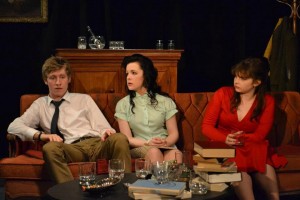tom lute, charlotte weeks & johnelle sciocchetti
When I was a teenager my voice teacher had a strict rule that none of her students were [typically] allowed to sing musical theatre songs sung by characters that we were too young to play realistically. Figuratively, I think she saw it akin to a child wearing her father’s boots and liable to accidentally trip down the stairs. At the time we found this rule absurdly annoying, as we all just wanted to sing “Take Me Or Leave Me” (or “Send in the Clowns”), but its wisdom grows on me more with every year that passes. The very young cast of The Dalhousie Theatre Society’s Who’s Afraid of Virginia Woolf?, at the Bus Stop Theatre however, certainly does not heed this advice and they make a strong case for why sometimes it is far more fun not to.
Edward Albee’s epic 1962 play, Who’s Afraid of Virginia Woolf?, is widely considered to be a masterpiece of the American theatre. It centers on a middle aged couple, George and Martha, trapped in a twisted, morose, cyclical evening of delusions, drunkenness and violent rage, who lure a younger couple into their perverse game of power and manipulation. Throughout the play both marriages unravel as secrets are revealed and the stage becomes a [metaphorical] powder keg threatening to explode, entirely incinerating all four characters into Hell in a handbag.
Albee has written this play to be deeply disturbing, intensely hilarious in the Absurdist style, but with gut-wrenching subtext of anguish and despair. It is a scathing critique of the futility and hollowness of the social conventions of our time and the vapid personas we construct for ourselves that bore other people to death. The Dalhousie Theatre Society’s production is more like a (figurative) child walking around in her father’s boots, but not falling, instead, poking fun at the absurdity of what growing old has done to George and Martha. This is also a theme inherent to Albee’s play, as the younger Honey and Nick are mirrored and contrasted to George and Martha. Indeed, even the names George and Martha (borrowed from the Washingtons) suggest that these two characters represent middle aged couples from across the ages, both past and future. Yet, the idea of the constructions of the images of youth by the old and vise versa become much more apparent in a cast where everyone is in their early twenties. In a way this production is a pastiche of Albee’s play, but one that does justice to the intensity of the characters’ emotions, even if the depth of the subtext isn’t there.
Charlotte Weeks is intensely captivating as tittering Honey, who cannot hold her liquor despite her best intentions to maintain the utmost in propriety under even the most dire of circumstances. She has this hilarious airy laugh that cuts through the scene with a perfect mixture of nervous and cordiality. Tom Lute is charming and boyish as Nick, the athletic young biology professor who has eyes for Martha, but a robust conceited, yet naive, sense of respectability with George. Jordan Gracie does wonders with bringing George to life, rooting him (and by extension the entire play) so specifically in the early 1960s, and giving him a poignant mixture of bitterness and lethargy. Indeed, there were moments where George and Martha reminded me of Scott and Zelda Fitzgerald. The sense of pacing and arc in Gracie seems quite seamless and he gives him a weightiness and sense of power that is uncommon for an actor so young. The banter between Gracie and Lute is often beautiful in its rhythm, intensity and the quick switches in power positions. Johnelle Scioccetti tackles Martha, oscillating nicely between extremes, although finding it a little difficult at times to justify how she has gotten from one to the other. She has a lovely sense of dignity and a powerful presence that makes her intensely captivating to watch.
There are a few minor directorial choices that detract from the realism of the piece, the use of an umbrella instead of a prop gun for George to scare Honey with, for example, and the choice to use plastic glasses, which make the scene where they all crash to the floor quite anticlimactic. Other than that, the momentum and the movement of the play is brisk and consistent and it creates an entertaining sense of mayhem and an effective sense of intrigue.
This production of Albee’s Who’s Afraid of Virginia Woolf? is not dark and twisted as so many famous productions are, but fine performances from a young cast highlighting the comedy of Albee’s dialogue makes The Dalhousie Theatre Society’s production a fun evening of theatre nonetheless.
Who’s Afraid of Virginia Woolf is closed.






 World Theatre Day: My God Is It Ever The Time to Invest in Canadian Plays
World Theatre Day: My God Is It Ever The Time to Invest in Canadian Plays 